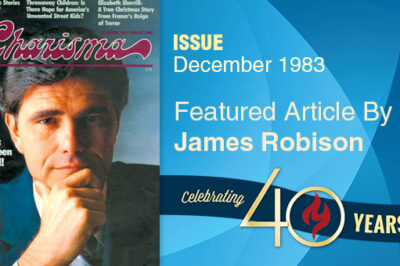Note: This article originally appeared in the December 1983 issue of Charisma magazine.
In the pulpit, he lashed out at audiences, believing his fury was of God. But alone, he wept, praying for freedom. When his deliverance came, he was transformed.
The rumors about James Robison first began about 18 months ago. Some say he was baptized in the Holy Spirit and has become a charismatic. Others have heard a layman prayed for him and he received deliverance. Still others say a layman was healed when Robison prayed for him.
But one thing everyone agrees upon: whatever the cause, James Robison has changed. The fiery Texas evangelist who was often referred to as “the Southern Baptists’ angry young man,” no longer sounds so furious. In fact, now he is telling people that one of the chief sins of the Church today is its failure to practice love:
The staunch fundamentalist who was taught to fear association with charismatics is now freely preaching to everyone and says “I’ve always believed all spiritual gifts are functional and for the church today.'” Even more startling, he is preaching on deliverance and casting demons out of people in mainline denominational churches. There, he says, he is seeing people overjoyed to be set free.
Although Robison has always been a dynamic speaker, he is reporting that the power of God is so great in his meetings that he has to pray for the safety of people rushing forward in services in their eagerness to get to the altar. He says that the Lord has shown him that he must be willing to take the Word to all circles of Christianity.
“I must take God’ s message and love to everyone—not just Baptists,” he says. And if all this weren’t enough, he is being seen in some strange places for a Baptist evangelist—Methodist churches, Christ For The Nations Institute, Ken Copeland meetings and Assemblies of God churches.
It is obvious that something happened in his life, but what was it? Robison built his reputation as a hard-hitting Baptist. His best friends are men like Jerry Falwell, Bailey Smith; Jimmy Draper (his own pastor and current president of the Southern Baptist Convention) and W.A. Criswell. If Robison has had some sort of charismatic experience, does he try to play it down?
“I don’ t play anything down,” he says. “I know God has anointed me and filled me with His Spirit and gifted me to preach with authority and power. I believe in the free exercise of all spiritual gifts and am teaching people not to fear any gifts. I personally have not spoken in tongues, but I have not resisted it.”
He says that extreme emphasis concerning gifts—both pro and con—has caused unnecessary dissension and division in the body.
“The church today doesn’t look or sound much like Jesus,” he says. “In many ways we sound more like the devil. We need to repent of our attitudes towards one another. We need to develop love for one another, diligently seeking to preserve the unity of faith in the spirit of peace. When we do that, the gifts are unctioned and when the gifts are unctioned, we mature in faith.
“I don’t believe the gifts are unctioned when you sit over here and say ‘I am a Pentecostal’ or ‘I am a Baptist ‘ It’s carnality. The Body’s not edified, we’re not equipped and there’s no revival.
“When we become an answer to the prayer of Jesus that we be one, when we quit following movements and denominations and follow Jesus only, then there will be a release of the Spirit unlike anything we’ve ever seen before and miracles will be commonplace.”
What has happened to James Robison?
“A person can only walk in the light that he has, the truth that has been imparted to him,” Robison says “Tragically , we sometimes preach against things we don’ t understand. We not only lean on our own understanding, we build on it.
“I often found myself building on the precepts of men, knowing how to ‘play the gallery'”—that is, telling the audience what he knew it would like to hear. “So, over the years I walked in the light that I had. But the light I had was, quite frankly, greatly affected by the opinions of men.”
Robison developed one of the most successful ministries in the country, overcoming great obstacles to do so. His was a spectacular rise. Robison began life under less than ideal circumstances.
His mother seriously considered aborting him.
Pregnant at age 41, deserted by her alcoholic husband, she was talked out of the abortion by a doctor with high moral principles. Shortly after little James was born, she put an ad in a Houston newspaper asking for someone who would love and care for her child.
The Rev. and Mrs. H.D. Hale of Pasadena, Texas, answered the ad and took James into their home. They reared him until the age of 5, then his mother took him back.
During the next 10 years, she married and divorced several times. Finally, when James was a teenager, she remarried his real father, who was still an alcoholic. The drunken quarrels he and James’ mother got into constantly left a permanent impression on the boy.
At age 15, he returned to live with the Hales and it was under their influence that he was saved. On the day he walked the aisle, Mrs. Hale had mobilized the entire church to pray for his salvation. So confident was she that she had thrown a change of clothes into the car so Robison could be baptized the same night—which he was.
Called to preach at age 18 and attending East Texas Baptist College, Robison began conducting citywide crusades. He witnessed everywhere he went—even approaching people in restaurants. Within two years of preaching his first revival, Robison had received more than 1,000 invitations from 27 states. Since then he has preached—by his own count—to more than 12 million people. He has seen 1 million accept Jesus as their Savior through his ministry. His weekly telecast, James Robison, Man with a Message, is syndicated nationally on more than 120 stations. Two of his TV specials, “Wake Up America—We Are All Hostages,” and “Attack on the Family” received awards for excellence in religious broadcasting. He has authored a number of books, including Save America to Save the World, In Search of a Father, The Right Mate, New Growth and Sex Is Not Love.
But in spite of his success, Robison was distressed over the lack of permanent, life-changing results he saw coming from his ministry.
“The problem I kept observing was that people were not becoming like Jesus. I would see thousands of people make professions of faith in Christ and be very genuine. But they went away captive of the adversary,” he says. “I found that going into churches was like going into ditches. The blind were leading the blind. They might be air-conditioned ditches or ditches that would seat thousands. They had gymnasiums and lots of activities, but they were still ditches of defeat, depression, division and diseases.
“I saw people coming to the living waters, but I didn’t see living water flowing back out of them,” he adds. “I saw them becoming at best a reservoir instead of a river. I saw people hanging in there, keeping a stiff upper lip, just toughing it out. But they were being defeated.”
Robison said that it was not just the defeat he saw in the lives of people he ministered to, but the defeat that he experienced in his own life that led to a crisis point. He became so miserable that he contemplated suicide. He was a man out of control, a man tormented.
“I couldn’t control my appetite,” he says. “I’m 6-foot-3 and I’ve never looked fat, but I gained so much weight I wouldn’t wear a three-piece suit for fear I’d take a deep breath and pop a button. It’s no laughing matter when you can’ t control your craving for chocolate or ice cream.”
It wasn’t just food that Robison had trouble controlling. He was plagued with unclean thoughts. “As I would preach, many times I would look at women eye-to-eye in the congregation. Demon spirits began to talk to me and, to my horror, I found I was unable to stop them. It got so bad that I have sat on platforms afraid to look up, knowing what I would see.”
“I knew then something had to happen to give me mental relief. What I needed was deliverance—but I didn’t even know it was a possibility.”
Robison also confesses that much of the anger in his preaching—what he considered “righteous indignation,” was really just “meanness of the devil.”
“I would get up to preach and I would think that the unction of the Spirit had come upon me,” he says. “I would go into a rage and lash out at everybody. I thought it was the power of the Holy Spirit, but I found that this kind of rage is not the Holy Spirit.”
It was Robison’s raging against sin that got him embroiled in controversy on more than one occasion. Four years ago he attracted national attention when he instituted a court challenge of the Federal Communication Commission’s fairness doctrine. He was upset by an interpretation of the standard by a Dallas TV station, WFAA, which canceled Robison’s Sunday morning program after he made continued attacks on homosexuality.
The homosexuality issue was the last in a series of confrontations between Robison and WFAA. Station management had been upset with him in 1975 when he gave a series of sermons on “false faith,” and mentioned certain cults by name. And in 1977, Robison’ s show was canceled briefly after he specifically attacked a gay church in Ft. Worth, Texas.
Today Robison says, “I’ve not lost any of my authority. I’ve not lost any boldness in dealing with sin. It’s just that I’ve gotten really serious about dealing with my own sin.”
He says his frustration was compounded because he was not experiencing the joy, peace and freedom that the New Testament says belongs to believers —and neither were many of his minister friends.
I kept listening to preachers talk about truth—and the truth setting you free—but I knew they weren’t free. I heard coarse jestings, filthy talk and jokes that would embarrass a sailor come out of preachers’ mouths. I would call Dudley Hall, my closest friend, at 3 a.m. and ask him, ‘Dudley, can you be free? Do you know anybody who’s free?'”
It was Hall who finally pointed Robison in the direction of Milton Green—a layman who changed the course of Robison’s life.
“We were all at a convention and Dudley came in,” recalls Robison. “He had been preaching in Alabama When the power of God came down and a layman named Milton Green came to speak to the preachers. When Dudley walked onto the platform that afternoon and sat down next to me, he said, ‘I’m free.’ I looked at him and knew he had told me the truth. When he walked to the pulpit to speak, he glowed with the glory and grace of Jesus.
“He began praying for the sick and trusting God to heal. But one night I called him to give him a piece of my mind and my Baptist mentality. I set him straight and then I started in on everybody else. But Dudley stopped me and said ‘You make me sick. I’m so tired of hearing your mouth. You call Milton Green tonight or don’t ever call me again, because you’re not serious with God.'”
Robison did call Green that night and invited him to fly with him to a crusade the next day. Green accepted and on the trip down began to share from the Word. “He shared it with undeniable power and authority—and God confirmed it,” remembers Robison.
That night after the meeting, Robison invited Green back to his hotel room to share further. But after they had talked a while, Green looked over at him and began to cry. He said, “I’ve been listening to you and praying for you for six years. I feel so sorry for you. I’ve cast demons out of prisoners, convicts, murderers, witches, drug addicts and Hell’s Angels, but I believe you’re the most demonized person I’ve ever seen. You’re so tormented I don’t know how you’ve kept your sanity.”
Robison said, “I knew I was talking to someone who knew me. Pride wanted me to tell him to get out of my room. To scream at him, ‘Don’t you know who I am?’
“But I knew who I was and I did need help. I had a claw in my brain.”
Green asked if he could pray for him and when Robison agreed, he put his hands on Robison’s shoulders and began to pray Scriptures. Then, he began to walk around the room and rebuke Satan loudly and with great authority. “I’d never heard anybody do that,” Robison said. “All I could think of was, ‘I hope these walls are thick. I hope nobody hears about this.’ Then, all of a sudden, he just stopped. He looked over at me and said `How do you feel?’
“I said, ‘Fine.’ He said, ‘Do you feel like anything’s left?’ I said I hadn’t felt anything. I wished I had. But I was talking to a man who lives by faith, not by sight. He leaned over and said ‘It’ s all over, son.’ He waved his hand over my eyes and said, ‘The scales are coming off.’ He touched my head and said, ‘All traffic in your head is going to stop. All that noise is going to be silent.’ And I thought, ‘Huh!’
“But two days later, back at home, I woke up and Scriptures that I had never memorized were just flowing out of my mouth and tears were streaming down my face. I grabbed my wife and cried, ‘Betty, it’s gone.’ What’s gone?’ she asked. ‘The claw in my brain,’ I said. ‘I’ve been set free.’ And since that day, the Word of God has come alive to me.”
The difference in Robison is startling to those who knew him well before. Members of his staff say it is like working for a new person and they are delighted with the new man.
Despite rumors, he has not left, nor been run out of the Southern Baptist church. But neither has he let the new light he has received be hidden under a bushel. Although he does not speak in tongues, a traditional Pentecostal litmus test for being “Spirit-filled,” charismatics and Pentecostals show signs of wanting to claim the new Robison as one of their own.
He is intent, however, on dodging such labels. He says he fords as much traditionalism and ritualism in Pentecostal circles as in Baptist ones. He sees his ministry as one of preaching liberation and reconciliation to all the squabbling members of Christ’s body. He seeks a return of the day when the followers of Jesus were known simply by the love they demonstrated one for another.
In a three-page letter he sent to all Southern Baptist leaders, he expressed fear that divisiveness has reached dangerous proportions among Southern Baptists. He apologized for his part in aiding the current power struggle between liberal and conservative factions in the church.
“Although pure in motive,” reads one portion of his letter, which was obtained by the Ft. Worth Star-Telegram newspaper and reprinted, “during my 21 years in ministry I was on occasion un-Christlike in method and approach. That which I believed to be God-given conviction often came across as unkind, poorly thought-out, abrasive, too general, casting many unnecessarily into the same pot and possibly damaging the very body of Jesus.”
Referring to some of his controversial stands, Robison said that while he still regarded homosexuality as sin, he believed it was no worse than Christians’ failure to love one another.
Robison also said in the letter that he has experienced “the most wonderful personal revival in my life.” In his new revival, he finds himself not just speaking salvation, healing and deliverance in civic centers to Baptist audiences, but in a wide spectrum of churches to a variety of listeners. And there is a new exuberance about his ministry, an almost childlike sense of awe at what God is doing.
“We are seeing people changed by the power of God,” he says. “Within one three-week period, I prayed for over 16,000 people who publicly repented and sought deliverance. People are just so hungry for God. Most of those who come to our meetings are Baptists. They are hungry for something to set them free and they realize traditionalism won’t do it. People who want the life of God are coming to the Word of God.
“I’m not seeking to please men,” he says. “Nothing matters to me but pleasing Jesus and I know He’s pleased. He’s got a grin from ear to ear—He’s so happy at what’s being done and accomplished for His glory.”
Not everyone is so pleased, however. Some people believe that Robison has been led astray by Green. Baptists who have embraced the teachings of Green are being called “Greenies” by detractors, who charge that churches are being split by those who have accepted Green’s message of healing and deliverance—preached at seminars sponsored by Robison.
Contributions to Robison’s ministry dropped almost 50 percent and he lost 20 percent of his TV affiliates shortly after he went public with his transformation.
Recently, his staff was elated that he had been invited to speak at First Baptist Church of Dallas. But church officials later announced that his appearance had been “postponed.” When he conducted a series of meetings at a large Baptist church in San Antonio, Texas, the pastor came under considerable fire from other pastors. Yet, the church was packed and when visitors were asked to stand, they made up half the congregation.
The secular press—never among Robison’s biggest fans—has been quick to jump onto the controversy. The Ft. Worth Star-Telegram ran a series of articles claiming that a number of Robison’s friends, including Jimmy Draper, Bailey Smith and Dr. Paige Patterson, were critical of the new direction of his ministry. But Robison says that many of those remarks were taken out of context or totally fabricated.
In fact, Robison has remained on good terms with Southern Baptist leaders, he says. While some Baptist churches have shut their doors to him, he still has more invitations from Baptist churches than he can fulfill.
Recently Robison preached at Cottage Hill Baptist Church in Mobile, Alabama, where Dr. Fred Wolfe, immediate past president of the Southern Baptist Convention’s pastors conference, is pastor. More than 3,000 attended the Sunday evening service with hundreds turned away. Wolfe was chairman of a citywide crusade conducted by Robison in November. Just before that, he spoke to standing-room-only crowds at Park Avenue Baptist Church in Titusville, Florida. Church members watched sessions by video in a nearby gymnasium so that more visitors could fit into the 1,500-seat auditorium.
Throughout the controversy, Robison has refused to join in “proof-text” battles with those who disagree with him. If he had any fears about the financial repercussions of his actions, an incident last year proved to him conclusively God’ s faithfulness.
When his finances began to dry up, he found himself heavily in debt. The ministry needed $1 million to survive. In what seemed like a dramatic answer to prayer, Cullen Davis, a controversial Texas millionaire Robison had led to the Lord, donated $1 million worth of jade, gold and silver art objects to the ministry. In one stroke it seemed as if the problems had been wiped out. But God had other ideas. He was teaching Robison a deeper lesson in the importance of obedience.
Several days before they were to sell the objects, Robison went over to the warehouse to inspect them. On the way, while he was reading his Bible, he read Deuteronomy 7:25-26 (NAS). These verses seemed to leap off the page: “You must burn the graven images of their gods with fire. You must not desire the silver or gold that is on them nor take any of it, lest you be snared by them, for it is an abomination to the Lord your God. You shall not bring an abomination into your house, lest you become cursed like it, but you must absolutely detest and abhor it, for it is a cursed thing.”
When he got to the warehouse, he discovered that most of the art objects were pagan idols.
“I looked at those things and the Lord said to me, ‘You can’ t have them.’ Yet I could see the things they could pay for. I could see the people we could help. But I loaded them on a truck and took them back to Cullen the next day.”
After Robison explained why he couldn’t keep them, Davis decided he couldn’t take them back, either. As Robison watched, the millionaire went outside and began smashing all the artworks right in his driveway.
Robison knew he had been obedient. But he was still $1 million in debt. However, two days later, his wife went to the mailbox and found a plain, white envelope with $200,000 in it. The same week a woman sent a check for $40,000.
Thousands of people also sent small gifts in response to the Holy Spirit’ s prompting,” added Robison. In one month, the entire $1 million was raised.
“I learned from that experience that you will never obey the Lord and regret it,” Robison says. “But you will regret it every time that you don’t obey Him.”
Robison believes that the church’s failure to be obedient to the whole Word is preventing worldwide revival. He is particularly distressed over the sectarianism he sees throughout the body of Christ.
“The time has come to stop debating, dialoguing and discussing,” says Robison. “We’ve got to come to the Word of God and be transformed, renewed and made one in Christ “
Robison believes that the age demands a voice—a prophet who will cry aloud to the church that judgment begins at the house of God. There is going to be a release of God’s judgment and purifying fire, he says. And when the flood and fury of God’s judgment comes, that fire will try our works to see if they are of wood, hay and stubble or of gold, silver and precious stones.
The church that Jesus Christ is coming for will be a bride adorned, a bride that is spotless, a bride prepared,” he says. “He’s not coming to get a harlot and there is going to have to be a purification. Life in the Word will no longer be optional. It’s going to be imperative to make it through 24 hours a day. Only those who are dressed up in Jesus with the whole armor of God will be prepared. That’s why this message must be heard.”
Something special has happened to James Robison’s life. He has been set free. He has been to the mountaintop and seen the glory of God. He is refusing to be owned by any faction of the Lord’ s church.
He has been transformed by the renewing of his mind, a workman who knows he need not be ashamed.







Leave a Comment
You must be logged in to post a comment.